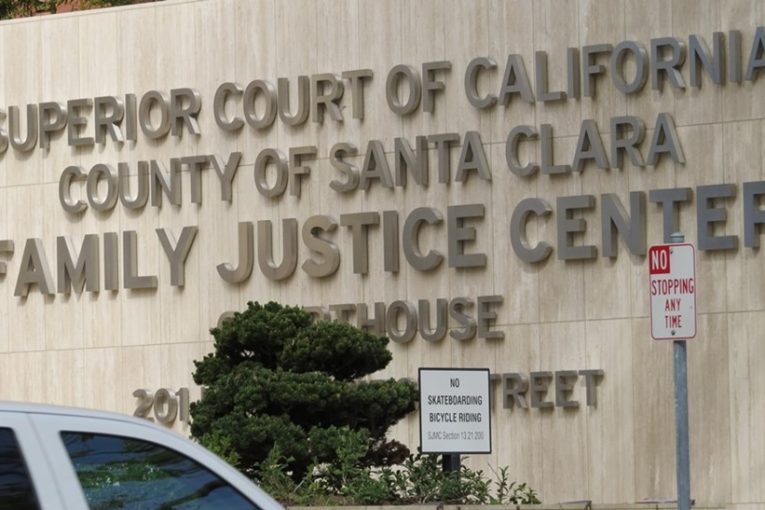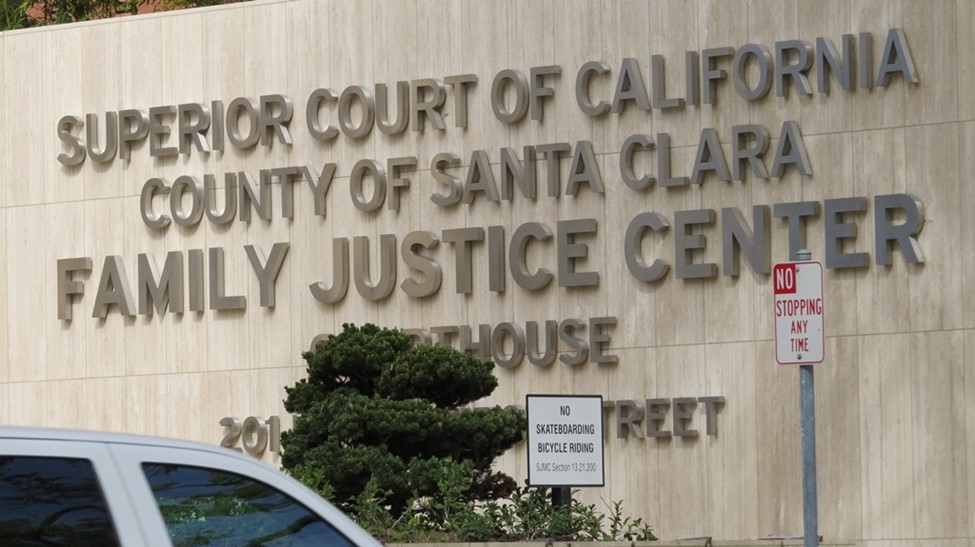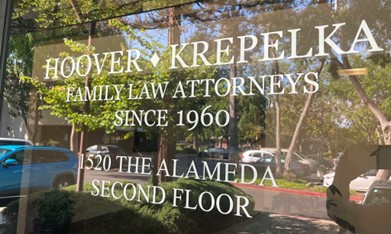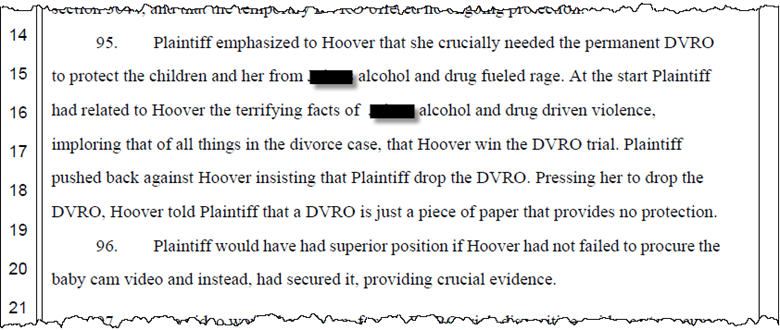

Former Client Files Civil Lawsuit Against Attorney James Hoover and Hoover Krepelka LLP
By Stephen James
Santa Clara County, CA – A former divorce client has filed a civil lawsuit for legal malpractice against attorney James Hoover and the San Jose-based Hoover Krepelka law firm.
Filed in Santa Clara County Superior Court, the lawsuit alleges multiple grounds for the legal action, including breach of contract, legal malpractice, breach of fiduciary duty, and unfair business practices, all in connection with a family court divorce case.
The litigation alleges that the attorney charged an exorbitant fee of $350,000 for 14 months of legal work. The client claims that despite the hefty price tag, Hoover failed to obtain critical evidence, disregarded the opposing spouse’s violations of standard court orders issued at the start of all divorce cases (“automatic temporary restraining orders”), and neglected to protect her and her children from alleged abuse that had previously involved Child Protective Services (CPS).
Illegal Attorney Referral Scheme Alleged

The litigation complaint also alleges that, to generate clients and business, Hoover and the law firm were using an illegal runner and capper scheme through WomenSV, a controversial Los Altos nonprofit that purports to assist victims of domestic violence.
A runner or capper is any person or firm who works as an agent for a lawyer in the solicitation or procurement of clients, in exchange for compensation or other form of consideration.
Under California Law, any client contract for legal services obtained by an attorney or law firm through the services of a runner or capper is void. “Ambulance chasing,” also illegal, is a similar way for attorneys to find clients.
Such schemes are typically associated with personal injury cases, where professionals such as police officers, doctors, or ambulance drivers inform attorneys of potential cases that could yield substantial legal fees through favorable jury awards or settlements.
In essence, the lawsuit alleges that Hoover received client referrals from the founder of WomenSV, Ruth Darlene Patrick. In exchange, Hoover served on the WomenSV advisory board and financially supported activities of the organization. The lawyer established a steady stream of referral business from traumatized domestic violence victims who sought help from the charity.
Malpractice Claims Include Failure to Obtain and Preserve Critical Evidence and Excessive Legal Fees

One aspect of the attorney malpractice case centers around Hoover’s failure to obtain and preserve as evidence a crucial video capturing the client’s ex-husband abusing their baby, which was recorded on a home security camera.
Hoover delayed obtaining the MacBook containing the evidence for months, only to discover that the former husband had sold it shortly after receiving Hoover’s evidence preservation letter.

In addition, Hoover advised the mother to withdraw her request for a protective restraining order, trivializing the order as nothing more than a “piece of paper.” As the divorce proceedings progressed, Hoover allegedly breached his promise to take the permanent domestic violence restraining order (DVRO) request to trial as scheduled. This delay, coupled with the lack of financial information and video evidence, impaired the settlement negotiations, ultimately pressuring the mother into an unfavorable settlement that granted father unsupervised visits.
This statement allegedly came after charging the client an exorbitant fee to obtain the order and threatening to withdraw on the eve of trials, causing significant emotional and financial distress during the divorce proceedings.
Following Hoover’s departure from the case, private judge Irwin Joseph partially refunded the retainer Hoover had previously demanded for a mediation session. However, the client learned that the refund was paid to Hoover, who kept the money without acknowledging it on any billing statements. Instead, Hoover claimed that she still owed an outstanding balance of $55,000.
Hoover’s legal expertise in high-asset divorce cases within Silicon Valley was bolstered by his advisory board position at WomenSV, thus enhancing his credibility. The lawsuit contends that this association was part of a broader scheme, particularly concerning cases involving real estate and the court settlement office of Sharon Roper.
Recently, Hoover attended a Silicon Valley Association of Realtors (SILVAR) meeting, where he encouraged real estate brokers and agents to, in effect, become runners and cappers, promising that if they referred divorcing clients to him, he would ensure that court authorized private judge Sharon Roper would be able to expedite home sales within the divorce court process.
Hoover’s presentation suggested that Roper would be appointed to handle divorce cases involving the sale of family homes. By doing so, brokers would be relieved of dealing with difficult sellers, as Roper’s appointment would strip the divorcing spouses of any decision-making power and speed up the sale, ultimately converting the home equity of divorcing couples into quick real estate commissions and his own attorney fees.
The former Hoover client points out in her lawsuit that she was billed for Sharon Roper’s services, despite never having met Roper or being aware of any contribution Roper made to her divorce case that would justify the attorney’s bills.
As the legal battle unfolds, many are now questioning the ethical practices of Jim Hoover and the Hoover Krepelka law firm. The outcome of this lawsuit will likely have far-reaching implications for both the attorney and the reputation of the firm.
